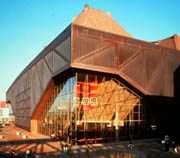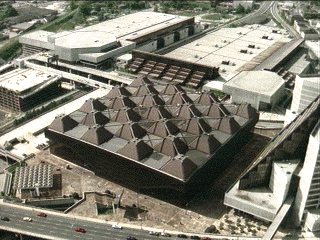| Omni Coliseum | |
|---|---|
| The Omni | |
 | |
| Location | 100 Techwood Drive, Atlanta, Georgia 30303 |
| Opened | 1972 |
| Closed | 1997 |
| Demolished | July 26, 1997 |
| Owner | City of Atlanta |
| Architect | Thompson, Ventulett, Stainback & Associates |
| Tenants | Atlanta Flames (NHL) (1972-1980) Atlanta Hawks (National Basketball Association) (1972-1997) Atlanta Chiefs (North American Soccer League) (1979-1981) 1988 Democratic National Convention (1988) Atlanta Attack (National Professional Soccer League II) (1989-1991) Atlanta Knights (IHL) (1992-1996) Atlanta Fire Ants (Roller Hockey International) (1994) 1977 NCAA Men's Division I Basketball Tournament |
| Capacity | Basketball: 16,378 Ice hockey: 15,278 |
 The Omni Coliseum, usually called The Omni, from the Latin for "all," or "every," was an indoor arena located in Atlanta, Georgia. Completed in 1972, the arena seated 16,378 for basketball and 15,278 for ice hockey. It was part of the Omni Complex, now known as the CNN Center. The only remaining reminder is the scoreboard from the Omni that now hangs in the pavilion of the Philips Arena.
The Omni Coliseum, usually called The Omni, from the Latin for "all," or "every," was an indoor arena located in Atlanta, Georgia. Completed in 1972, the arena seated 16,378 for basketball and 15,278 for ice hockey. It was part of the Omni Complex, now known as the CNN Center. The only remaining reminder is the scoreboard from the Omni that now hangs in the pavilion of the Philips Arena.
History[]
This arena was an architectural marvel when first constructed, combining innovative design for the roof, seating, and the structure itself. The logo is based on the unique seating arrangement. Its exterior of Cor-Ten was supposed to "surface rust" to seal itself, making a solid steel structure that would last for decades. The Omni was noted for its distinctive space frame roof, often joked about as looking like an egg crate or a rusty waffle iron. Designed by the firm of Thompson, Ventulett, Stainback & Associates with structural engineering work by the firm of Prybylowski and Gravino, the roof was technically described as an ortho-quad truss system.
Basketball and Hockey[]
The Omni was home to the NBA Atlanta Hawks from 1972 to 1997, the NHL Atlanta Flames from 1972–1980 (now the Calgary Flames), and the IHL Atlanta Knights (1992-1996). The Knights were the only pro team to win a championship in the building by winning the Turner Cup in 1994. The arena also hosted the 1977 NCAA Final Four, won by Marquette University over University of North Carolina, the 1978 NBA All-Star Game, and the 1993 NCAA Women's Basketball Final Four. The Flames had since been replaced by the Atlanta Thrashers, who began play in 1999 after the Omni was demolished and Philips Arena was built. However, like the Flames, the Thrashers would subsequently move to Canada, moving to Winnipeg, Manitoba in 2011 to become the new incarnation of the Winnipeg Jets.
Problems[]

Bird's eye view of the Omni Coliseum
One of the problems with the building was that some of the innovations were not successful. The worst was that the exterior never ceased rusting to seal itself. By the mid 1990s, the rusting exterior had holes big enough that chain link fences were installed in a number of locations to keep people from crawling through the wall to see events. In the late 1980s and early 1990s, a growing number of NBA and NHL teams started constructing new arenas with better amenities for their high-end customers, such as luxury boxes, club-level seating, and massive club concourses, in order to increase their revenue streams. Some of these new arenas had as many as 200 luxury boxes, compared to the Omni which had only had 16 such boxes, and no club level at all, thus putting the Atlanta Hawks at a disadvantage. It also became a disadvantage to the city of Atlanta; until the now-defunct Georgia Dome was finished in 1992, the Omni served as its largest indoor facility in terms of seating capacity.
Built on a former railroad yard, after construction, the Omni settled more than its designers expected. There were unanticipated stresses in the space frame roof, which often leaked water.
Although the Omni hosted many events, it lost more than its share due to the smaller seating capacity and lack of amenities when compared to newer buildings in other cities. Despite quite enjoyable seating and viewing for the fans, the structure had the outward appearance of looking dated by the early-'90s (although the arena was only 20 years old), so there was a collective effort by many parties to build a replacement. This also stemmed from the desire of Ted Turner to own an NHL franchise; the Atlanta Flames had been sold to Canadian businessmen and relocated to Calgary, Alberta a decade earlier. However, the only way the league would approve an expansion team to him would be with the guarantee of a new arena. In 1997, the Omni was demolished by implosion, despite its close proximity to the CNN Center, the Georgia World Congress Center, and the Omni MARTA station. State Farm Arena was constructed on the Omni's footprint and opened two years later.
| Preceded by none |
Home of the Atlanta Flames 1972 – 1980 |
Succeeded by Stampede Corral (as the Calgary Flames) |
| Preceded by none |
Home of the Atlanta Knights 1992 – 1996 |
Succeeded by Colisée Pepsi (as the Quebec Rafales) |
